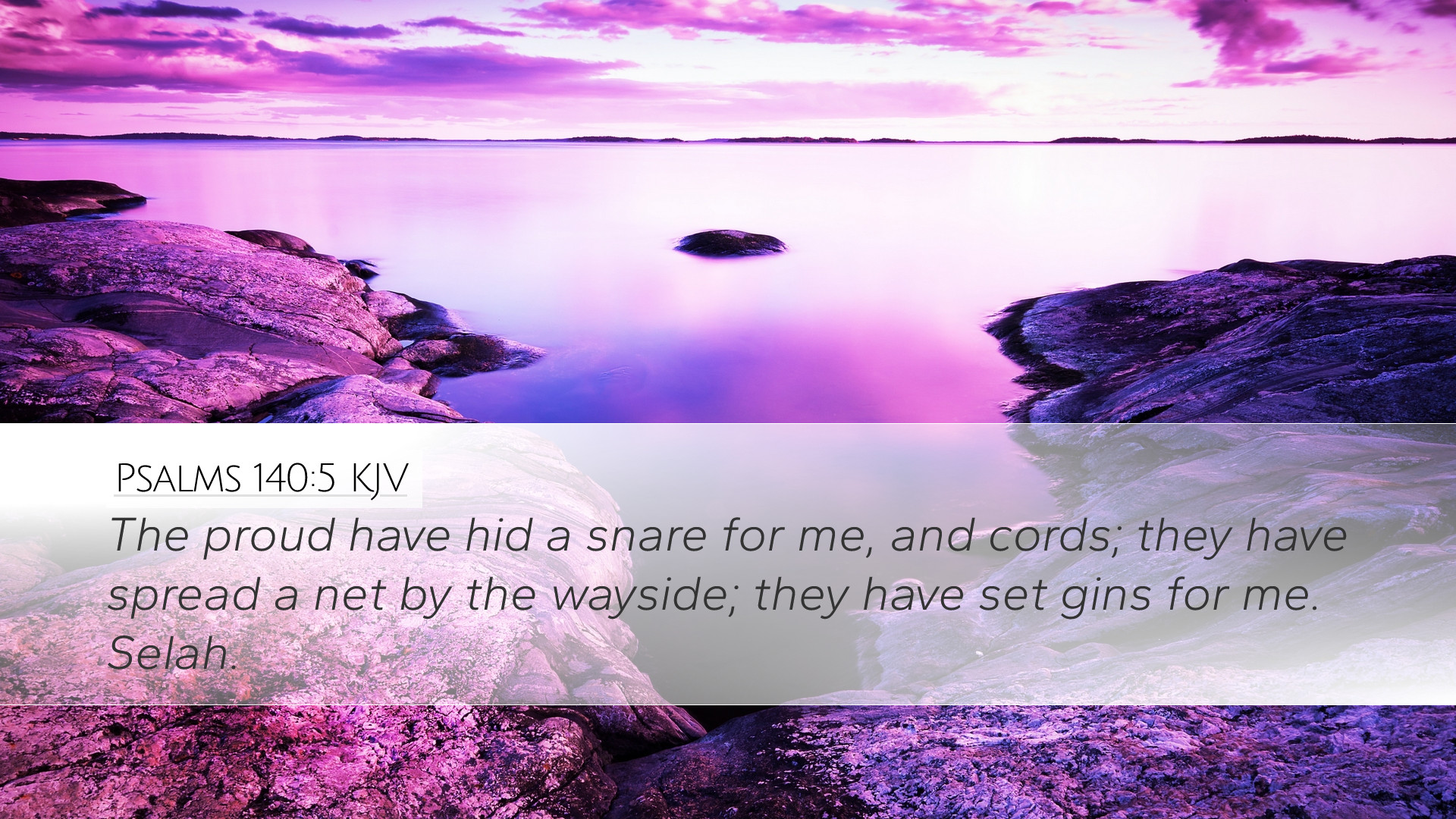Psalms 140:5 - Commentary and Insights
Verse: "The proud have hid a snare for me, and cords; they have spread a net by the wayside; they have set gins for me." (Psalms 140:5)
Introduction
The psalmist expresses a deep sense of peril amidst the schemes of the proud. This verse encapsulates the threats that arise from prideful adversaries and beckons a closer examination of the nature of these threats and the responsive posture of faith.
Contextual Analysis
This psalm is attributed to David and reflects his trials, particularly during times when he was pursued by enemies. It illustrates not only his personal experience but speaks to a broader spiritual truth applicable to all believers who face opposition. The mention of snares and nets is illustrative of the tactics employed by the wicked.
Insights from Matthew Henry
According to Matthew Henry, this verse brings to light a few vital observations:
- The Nature of the Adversary: The "proud" signifies those who are arrogant and who blatantly oppose the righteousness of God. Their pride blinds them to both their own sin and their eventual downfall.
- The Strategy of Deceit: The imagery of snares and nets suggests that the proud are not openly aggressive but rather operate through deceit and cunning. They set traps to ensnare the unknowing.
- The Importance of Vigilance: The psalmist’s awareness of their tactics calls for vigilance among believers. It reminds them to be cautious not only of physical perils but also moral and spiritual ones.
Insights from Albert Barnes
Albert Barnes further expands on this verse by highlighting the following points:
- The Double Nature of the Threat: Barnes indicates that the snares “hiding” an imminent threat symbolize both physical and spiritual dangers. The proud seek to bring about the fall of the righteous not only through aggression but also deception.
- Response of the Faithful: He emphasizes how the faithful should continually seek God’s protection, acknowledging that these traps may be invisible. This calls for an active engagement in prayer and reliance on divine strength.
- The Assurance of Deliverance: Barnes assures readers that while the threats are real, God’s promise of protection remains steadfast. Hope must prevail in the hearts of the faithful.
Insights from Adam Clarke
Adam Clarke offers a thorough examination of the verse, focusing on:
- Symbolic Interpretation: Clarke elucidates that the snare metaphorically represents licentiousness and entrapments due to sin, illustrating how the proud entangle others to fall into their wicked ways.
- Divine Justice: He points out that the actions of the proud will not go unpunished, as God is just and will ultimately vindicate the oppressed. The imagery further reinforces the notion of divine oversight.
- The Call to Prayer: Clarke stresses the necessity of prayer when confronting such oppositions, reinforcing his belief that reliance on God leads to wisdom and discernment necessary to navigate through life’s complexities.
Theological Reflection
This verse not only underscores the reality of enemy schemes but also elucidates a significant principle within theology: the ongoing battle between humility and pride. The scriptures frequently caution against pride while uplifting the humble. The proud view their elevation as an asset, often at the expense of others; they craftily lay traps for those who they perceive as threats to their status.
Practical Application
For pastors, students, and theologians, the insights from this passage demonstrate the relevance of being spiritually discerning and alert to presumptuous behavior within and outside the church community. Here are several applications:
- Encourage Discernment: Help congregants cultivate a discerning spirit to recognize the scheming tactics present in their lives.
- Leverage Prayer as a Defense: Reinforce the importance of prayer as a fortifying agent against external threats and internal struggles with pride.
- Foster Humility: Teach the values of humility and mutual support within the community, ensuring that pride does not take root among leaders and congregants alike.
Conclusion
Psalms 140:5 serves as a profound reminder of the spiritual battleground that each believer must navigate. Through the combined insights of respected biblical commentators, we learn the significance of being aware of the traps set by the proud, cultivating a deep reliance on God's protection, and fostering humility within ourselves and our communities. As we reflect on this verse, let us remain vigilant in our walk of faith, ever seeking to align ourselves with God’s purposes.


